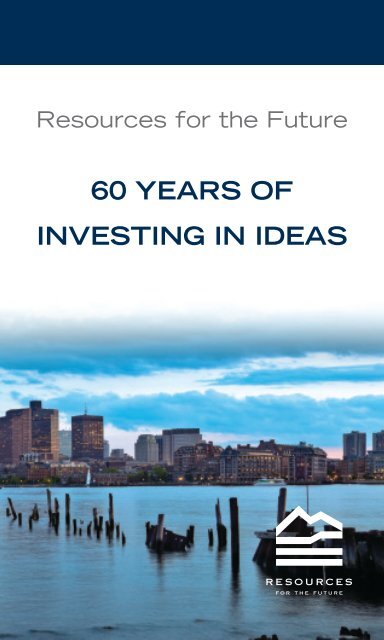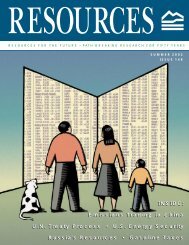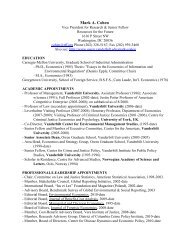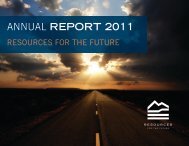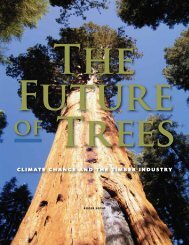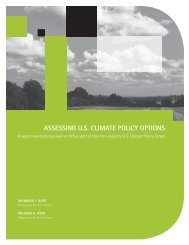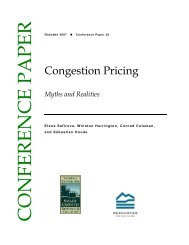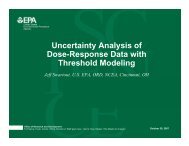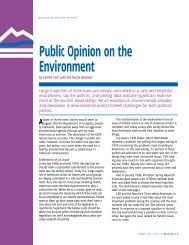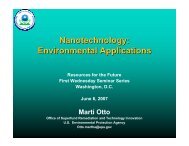Download the RFF brochure - Resources for the Future
Download the RFF brochure - Resources for the Future
Download the RFF brochure - Resources for the Future
Create successful ePaper yourself
Turn your PDF publications into a flip-book with our unique Google optimized e-Paper software.
<strong>Resources</strong> <strong>for</strong> <strong>the</strong> <strong>Future</strong><br />
60 YEARS OF<br />
INVESTING IN IDEAS
WHO WE ARE<br />
For more than a half century, <strong>Resources</strong> <strong>for</strong> <strong>the</strong> <strong>Future</strong> (<strong>RFF</strong>) has<br />
served as a steward of natural resources, providing objective economic<br />
research and policy analysis to help leaders make in<strong>for</strong>med decisions<br />
about complex environmental challenges.<br />
Public, private, and nonprofit decisionmakers around <strong>the</strong> world call upon<br />
<strong>RFF</strong> experts to design, analyze, and evaluate policies; advise government<br />
officials on policy options; develop tools <strong>for</strong> efficient decisionmaking;<br />
create methods to accurately value intangibles; and convene thought<br />
leaders and stakeholders to discuss current and emerging issues.<br />
How We Stand Apart<br />
• Recognized as independent and nonpartisan<br />
• Focused on <strong>the</strong> economics of environmental and natural<br />
resource policy<br />
• Trusted by public, private, and nonprofit leaders<br />
• Located in Washington, DC, only minutes away from <strong>the</strong> White<br />
House and Capitol Hill<br />
• Committed to intellectual excellence and practical<br />
solutions
ABOUT US<br />
<strong>Resources</strong> <strong>for</strong> <strong>the</strong> <strong>Future</strong> is an independent, nonpartisan organization<br />
that conducts economic research and analysis to help leaders make<br />
better decisions and craft smarter policies about natural resources and<br />
<strong>the</strong> environment.<br />
Our Core Values<br />
With a focus on environmental economics, <strong>RFF</strong> is committed to<br />
utilizing research excellence and independent analysis to deliver<br />
practical solutions.<br />
Our Experts<br />
<strong>RFF</strong> brings toge<strong>the</strong>r Ph.D. economists and o<strong>the</strong>r leading experts<br />
focused on environmental, natural resource, and energy issues.<br />
Our Governance<br />
<strong>RFF</strong>’s Board of Directors includes industry and environmental leaders,<br />
as well as <strong>for</strong>mer policymakers and preeminent scholars.<br />
Our Support<br />
As a 501(c)(3) organization, <strong>RFF</strong> is supported by donors who understand<br />
<strong>the</strong> role that rigorous, objective research plays in <strong>for</strong>mulating sound<br />
public policies.
OUR ROLE<br />
Leaders today face environmental challenges that have serious<br />
implications <strong>for</strong> economic growth as well as economic choices that will<br />
shape <strong>the</strong> future of <strong>the</strong> environment. Creating policies that satisfy both<br />
needs is not easy. <strong>RFF</strong> is a credible, independent voice that helps “cut<br />
through <strong>the</strong> noise” of current debates, providing decisionmakers in <strong>the</strong><br />
public and private sectors with <strong>the</strong> ability to understand <strong>the</strong> present<br />
and prepare <strong>for</strong> <strong>the</strong> future.<br />
<strong>RFF</strong> has helped streng<strong>the</strong>n both <strong>the</strong> environment and <strong>the</strong> economy<br />
through research and analysis on topics such as:<br />
• alternative ways to more cost-effectively reduce carbon<br />
emissions and U.S. dependence on oil;<br />
• <strong>the</strong> social and economic benefits of investments in conservation;<br />
• <strong>the</strong> risks associated with <strong>the</strong> new drive <strong>for</strong> natural gas;<br />
• <strong>the</strong> tough choices about tradeoffs to address resource scarcity;<br />
• <strong>the</strong> cost-effectiveness of environmental regulations; and<br />
• frameworks <strong>for</strong> valuing intangibles, such as clean air and water.
OUR WORK<br />
<strong>RFF</strong> provides a foundation <strong>for</strong> policymaking based on facts, analyzing<br />
issues that directly affect <strong>the</strong> well-being of current and future<br />
generations. In addition to an active portfolio of research focused on<br />
<strong>for</strong>est management and conservation, risk management, water policy,<br />
and regulatory analysis, <strong>RFF</strong>’s Centers of Excellence focus <strong>RFF</strong>’s<br />
research in three key areas.<br />
In <strong>the</strong> Center <strong>for</strong> Climate and Electricity Policy (CCEP), experts conduct<br />
new research on domestic climate change mitigation policies—with an<br />
emphasis on <strong>the</strong> U.S. electricity market—while building upon a legacy of<br />
analysis of climate change adaptation and global mitigation strategies.<br />
<strong>RFF</strong> Center <strong>for</strong> <strong>the</strong> Management of Ecological Wealth (CMEW)<br />
scholars work with practitioners and policymakers to incorporate<br />
ecological science into public policies and resource management<br />
decisions that protect, enhance, and manage <strong>the</strong> social benefits of<br />
natural systems.<br />
Experts in <strong>RFF</strong>’s Center <strong>for</strong> Energy Economics and Policy (CEEP)<br />
conduct research to help policymakers understand <strong>the</strong> efficiency and<br />
effectiveness of legislative, regulatory, and o<strong>the</strong>r options <strong>for</strong> <strong>the</strong><br />
sustainable development of energy resources.<br />
<strong>RFF</strong> actively shares <strong>the</strong> results of its work with policymakers,<br />
environmental organizations, <strong>the</strong> business community, academic<br />
scholars, <strong>the</strong> media, and <strong>the</strong> interested public.
OUR LEGACY<br />
In 1951, President Truman’s Materials Policy Commission recommended<br />
<strong>the</strong> <strong>for</strong>mation of an independent organization to analyze <strong>the</strong> supply of<br />
<strong>the</strong> country’s natural resources. <strong>RFF</strong> was founded in 1952 to answer<br />
that call.<br />
Supported initially by grants from <strong>the</strong> Ford Foundation, <strong>RFF</strong> focused<br />
its early years on natural resource scarcity and import dependence. It<br />
became <strong>the</strong> first “think tank” devoted exclusively to natural resource<br />
and environmental issues.<br />
<strong>RFF</strong> pioneered <strong>the</strong> field of environmental and natural resource<br />
economics, providing policymakers around <strong>the</strong> world with <strong>the</strong> tools to<br />
better grasp <strong>the</strong> many dimensions of resource scarcity, and improving<br />
<strong>the</strong> way policy decisions are made.<br />
1616 P St. NW • Washington, DC 20036 • 202.328.5000<br />
www.rff.org


